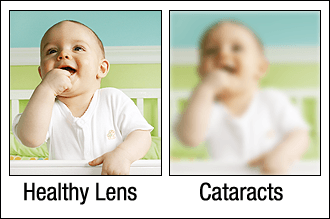Cataract Surgery
What Is a Cataract?

A cataract is a clouding of the eye’s natural lens. More than half of all Americans over age 65 develop cataracts. A cataract is not only age-related, however, and may develop after sustaining an eye injury or with long-term steroid use. Patients with diabetes may develop cataracts at a younger age as well. A cataract causes a view similar to looking through a dirty windshield. This hazy vision makes daily activities like reading, driving, computer work, and hobbies more difficult, and eventually if left untreated, impossible.
What Are the Symptoms of Cataracts?
The symptoms of cataract vary for each patient. One patient might experience all the symptoms, where another patient might only be bothered by one. The most common symptoms are blurry vision while reading and driving, difficulty seeing while doing close-up activities such as playing cards, woodworking, or sewing, halos around lights, glare from headlights, and dull color vision. Another common symptom is a frequently changing glasses or contact lens prescription.
How Are Cataracts Treated?
In the early stages, cataracts merely cause a change in glasses or contact lens prescription. However, as cataracts progress, a change in prescription will no longer help. At this point, a simple procedure to remove the cloudy lens and replace it with a crystal-clear lens implant is indicated. Advanced specialty lens implants are now available to help reduce dependence on glasses or contact lenses at the time of cataract surgery.
Am I a Candidate for Cataract Surgery?
Merely having a cataract is not an indication for surgery. Patients often have cataracts that progress for years before surgery is necessary to clear the vision. When your cataracts worsen to the point that a change in glasses or contact lens prescription will not improve your vision, and your daily activities such as driving, reading, watching television, working, hobbies, etc. are becoming difficult, it might be time for cataract surgery. A full eye examination with your family eye doctor, or an evaluation with Dr. Hummel, is the only way to know for certain if your cataracts are ready to be removed.
What Happens During Cataract Surgery?
Cataract surgery is performed by Dr. Chris Hummel in a fully accredited outpatient surgery center or hospital. The patient is at the facility for about three hours; however, the surgery only takes less than 10 minutes. An IV medication is given to relax the patient, and only topical numbing drops (no shots or needles!) are used in the eye. The cloudy cataract is gently removed and replaced with a clear lens implant. The small incision self-seals, so stitches are rarely needed. The patient is not required to wear a patch, but it is common for the vision to be blurry immediately after surgery. After some juice and a snack in the recovery area, the patient must have a driver to take them home. Prescription eye drops are used for approximately three weeks, and three postoperative visits are indicated in the month following the surgery.
